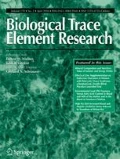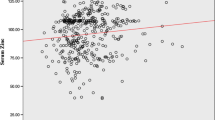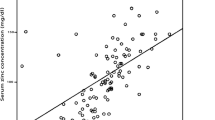Abstract
Depression is an important cause of morbidity, and World Health Organization has predicted that it will be the second leading contributor to the global burden of disease by 2020. Postgraduate students are at high risk for depression caused by the stress of examinations, the academic environment, and relationship problems with peers, lecturers, and family members. Physical inactivity, advancing age, unmarried status, and many other factors contribute to the development of depression in humans. Associations between symptoms of depression and the intake of nutrients such as magnesium have been investigated; however, the relationship between zinc intake and depression has not received as much attention. The purpose of the present study was to examine the relationship between dietary intake of zinc and depression in postgraduate students. This study was conducted on 402 participants with a mean age of 32.54 ± 6.22 years, including 173 (43%) women and 229 (57%) men. In this study, we found an inverse relationship between dietary intake of zinc and depression. The results persisted even after we controlled for several potential confounding variables related to depression symptoms, including age, sex, years of education, smoking status (current and past), and physical activity. The results of this study show that long-term intake of zinc may modulate symptoms of depression.
Similar content being viewed by others
References
World Health Organization (2002) Estimates of DALYs by sex, cause and level of development for 2002 from http://www.who.int/healthinfo/bodgbd2002revised/en/index.htm
World Health Organization (2006) Department of Non-Communicable Disease Surveillance. www.who.int.com
Murray CJL, Lopez AD (1996) Global health statistics: a compendium of incidence, prevalence and mortality estimates for over 200 conditions; Global health statistics: a compendium of incidence, prevalence and mortality estimates for over 200 conditions. Harvard University Press
Bayram N, Bilgel N (2008) The prevalence and socio-demographic correlations of depression, anxiety and stress among a group of university students. Soc Psych Psych Epid 43:667–672
Khan TM, Sulaiman SA, Hassali MA (2010) Mental health literacy towards depression among non medical students at a Malaysian university. Ment Health Fam Med 7:27
Peterlini M, Tiberio IFLC, Saadeh A, Pereira JCR, Martins MA (2002) Anxiety and depression in the first year of medical residency training. Med Educ 36:66–72
Eisenberg D, Gollust SE, Golberstein E, Hefner JL (2007) Prevalence and correlates of depression, anxiety, and suicidality among university students. Am J Orthopsychiatry 77:534–542
Jerstad SJ, Boutelle KN, Ness KK, Stice E (2010) Prospective reciprocal relations between physical activity and depression in female adolescents. J Consult Clin Psychoi 78:268
Richardson TM, Friedman B, Podgorski C et al (2011) Depression and its correlates among older adults accessing aging services. Am J Geriat Psychiat. doi:0.1097/JGP.0b013e3182107e50
Yary T, Soleimannejad K, Rahim A et al (2010) Contribution of diet and major depression to incidence of acute myocardial infarction(AMI). Lipids Health Dis 9:133
Jacka FN, Overland S, Stewart R, Tell GS, Bjelland I, Mykletun A (2009) Association between magnesium intake and depression and anxiety in community-dwelling adults: the Hordaland Health Study. Australas Psychiatry 43:45–52
Takeda A, Tamano H (2009) Insight into zinc signaling from dietary zinc deficiency. Brain Res Rev 62:33–44
Amani R, Saeidi S, Nazari Z, Nematpour S (2010) Correlation between dietary zinc intakes and its serum levels with depression scales in young female students. Biol Trace Elem Res 137(2):150–158
Frederickson CJ, Koh JY, Bush AI (2005) The neurobiology of zinc in health and disease. Nat Rev Neurosci 6:449–462
Szewczyk B, Poleszak E, Sowa-Kucma M et al (2008) Antidepressant activity of zinc and magnesium in view of the current hypotheses of antidepressant action. Pharmacol Rep 60:588–589
Williams A, Cotter A, Sabina A, Girard C, Goodman J, Katz DL (2005) The role for vitamin B-6 as treatment for depression: a systematic review. Fam Pract 22:532
Radloff LS (1977) The CES-D scale: a self-report depression scale for research in the general population. Appl Psychol Meas 1:385
Willett WC, Sampson L, Stampfer MJ et al (1985) Reproducibility and validity of a semiquantitative food frequency questionnaire. Am J Epidemiol 122:51–65
Kimiagar SM, Ghaffarpour M, Houshiar-Rad A, Hormozdyari H, Zellipour L (1998) Food consumption pattern in the Islamic Republic of Iran and its relation to coronary heart disease. East Mediterr Health J 4:539–547
Romieu I, Parra S, Hernbndez JF, Madrigal H, Willett W, Hernbndez M (2005) Questionnaire assessment of antioxidants and retinol intakes in Mexican women. Arch Med Res 30:224–239
Whittle N, Lubec G, Singewald N (2009) Zinc deficiency induces enhanced depression-like behaviour and altered limbic activation reversed by antidepressant treatment in mice. Amino acids 36:147–158
Salgueiro MJ, Zubillaga M, Lysionek A et al (2000) Zinc status and immune system relationship. Biol Trace Elem Res 76:193–205
Bao B, Prasad AS, Beck FWJ et al (2010) Zinc decreases C-reactive protein, lipid peroxidation, and inflammatory cytokines in elderly subjects: a potential implication of zinc as an atheroprotective agent. Am J Clin Nutr n 91:1634
Prasad AS, Beck FWJ, Bao B et al (2007) Zinc supplementation decreases incidence of infections in the elderly: effect of zinc on generation of cytokines and oxidative stress. Am J Clin Nutr 85:837
McAfoose J, Baune BT (2009) Evidence for a cytokine model of cognitive function. Neurosci Biobehav R 33:355–366
King LE, Osati-Ashtiani F, Fraker PJ (2002) Apoptosis plays a distinct role in the loss of precursor lymphocytes during zinc deficiency in mice. J Nutri 132:974
Tamano H, Kan F, Kawamura M, Oku N, Takeda A (2009) Behavior in the forced swim test and neurochemical changes in the hippocampus in young rats after 2-week zinc deprivation. Neurochem Int 55:536–541
Murck H, Song C, Horrobin DF, Uhr M (2004) Ethyl-eicosapentaenoate and dexamethasone resistance in therapy-refractory depression. Int J Neuropsychopharmacol 7:341–349
Pittenger C, Sanacora G, Krystal JH (2007) The NMDA receptor as a therapeutic target in major depressive disorder. CNS Neurol Disord Drug Targets 6:101–115
Rosa AO, Lin J, Calixto JB, Santos ARS, Rodrigues ALS (2003) Involvement of NMDA receptors and l-arginine-nitric oxide pathway in the antidepressant-like effects of zinc in mice. Behav Brain Res 144:87–93
Szewczyk B, Poleszak E, Wlaz P et al (2009) The involvement of serotonergic system in the antidepressant effect of zinc in the forced swim test. Prog Neuro-Psychoph 33:323–329
GarcÆa Colunga J, Reyes Haro D, Godoy GarcÆa IU, Miledi R (2005) Zinc modulation of serotonin uptake in the adult rat corpus callosum. J Neurosci Res 80:145–149
Smart TG, Xie X, Krishek BJ (1994) Modulation of inhibitory and excitatory amino acid receptor ion channels by zinc. Prog Neurobiol 42:393
Acknowledgments
We are indebted to all Iranian students in Malaysia, especially the students who participated in this study. We wish to thank Azad University and the Scientific Counselor and Director of Iranian Students Affairs in South East Asia in Malaysia, particularly Professor Azizallah Memariani, for the encouragement and support.
Author information
Authors and Affiliations
Corresponding author
Rights and permissions
About this article
Cite this article
Yary, T., Aazami, S. Dietary Intake of Zinc was Inversely Associated with Depression. Biol Trace Elem Res 145, 286–290 (2012). https://doi.org/10.1007/s12011-011-9202-y
Received:
Accepted:
Published:
Issue Date:
DOI: https://doi.org/10.1007/s12011-011-9202-y




